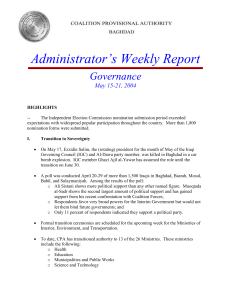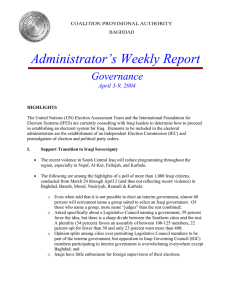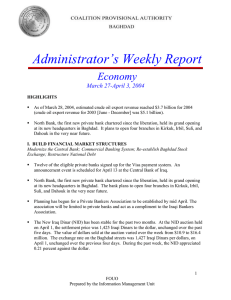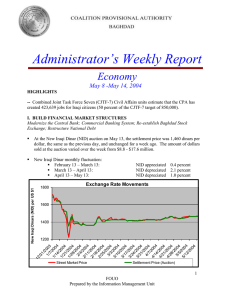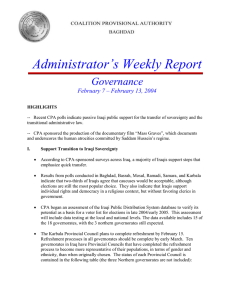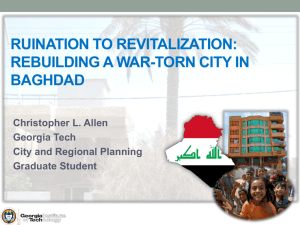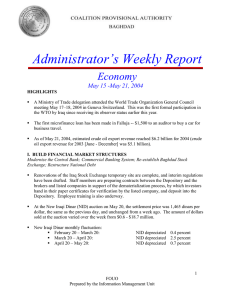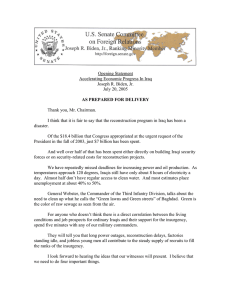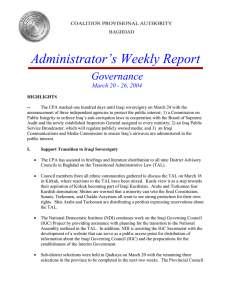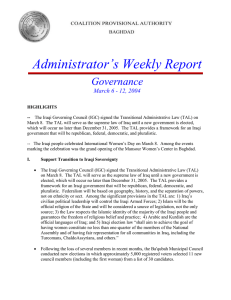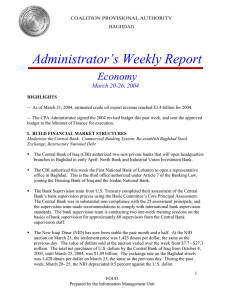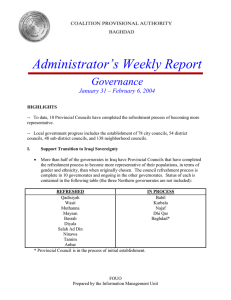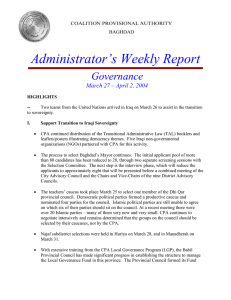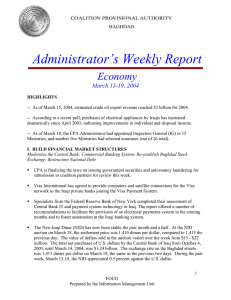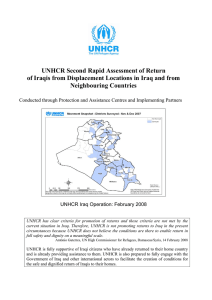Administrator’s Weekly Report Governance April 10-16, 2004
advertisement
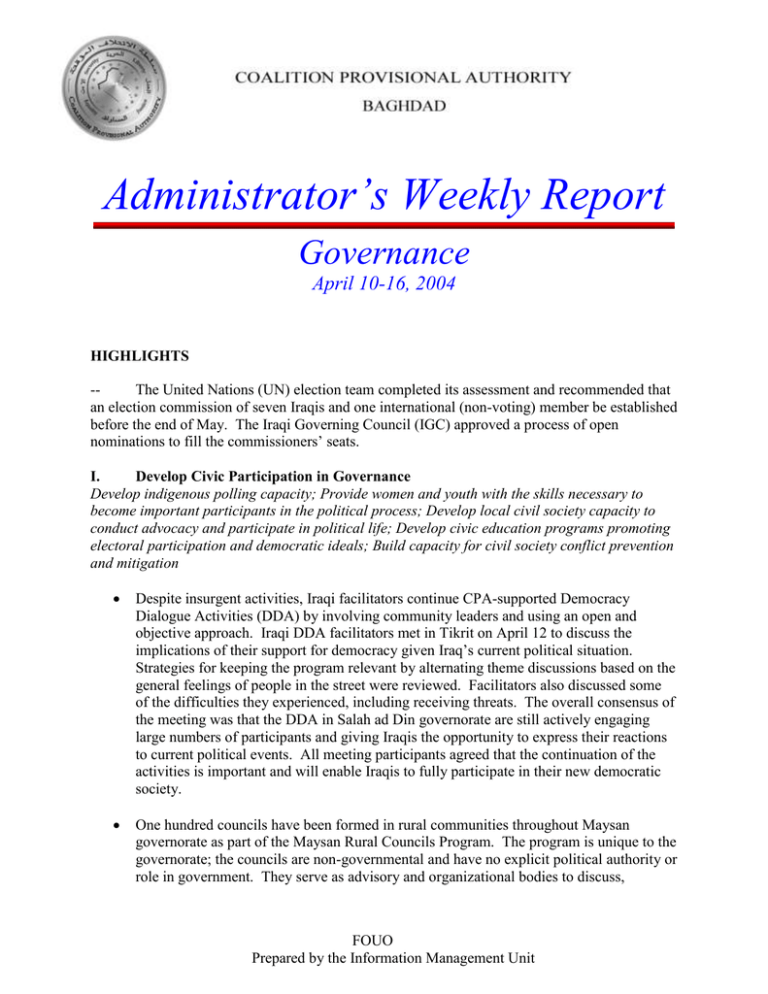
Administrator’s Weekly Report Governance April 10-16, 2004 HIGHLIGHTS -The United Nations (UN) election team completed its assessment and recommended that an election commission of seven Iraqis and one international (non-voting) member be established before the end of May. The Iraqi Governing Council (IGC) approved a process of open nominations to fill the commissioners’ seats. I. Develop Civic Participation in Governance Develop indigenous polling capacity; Provide women and youth with the skills necessary to become important participants in the political process; Develop local civil society capacity to conduct advocacy and participate in political life; Develop civic education programs promoting electoral participation and democratic ideals; Build capacity for civil society conflict prevention and mitigation Despite insurgent activities, Iraqi facilitators continue CPA-supported Democracy Dialogue Activities (DDA) by involving community leaders and using an open and objective approach. Iraqi DDA facilitators met in Tikrit on April 12 to discuss the implications of their support for democracy given Iraq’s current political situation. Strategies for keeping the program relevant by alternating theme discussions based on the general feelings of people in the street were reviewed. Facilitators also discussed some of the difficulties they experienced, including receiving threats. The overall consensus of the meeting was that the DDA in Salah ad Din governorate are still actively engaging large numbers of participants and giving Iraqis the opportunity to express their reactions to current political events. All meeting participants agreed that the continuation of the activities is important and will enable Iraqis to fully participate in their new democratic society. One hundred councils have been formed in rural communities throughout Maysan governorate as part of the Maysan Rural Councils Program. The program is unique to the governorate; the councils are non-governmental and have no explicit political authority or role in government. They serve as advisory and organizational bodies to discuss, FOUO Prepared by the Information Management Unit prioritize, and present local community needs to formal government institutions, including the new district councils and the representatives of national ministerial departments involved with providing municipal and social services. On April 14, twenty representatives of Iraqi Civil Society Organizations (CSO) participated in a three-day training program in Kirkuk aimed at developing a stronger relationship between local government and CSOs. Participants were trained on the steps necessary to develop “social partnerships” between local governments and CSOs to become more effective advocates for their causes. The representatives were also trained to communicate more effectively with the public by using the media to highlight particular issues. CPA continues to work with city governments to rehabilitate their facilities, including a new grant for the rehabilitation of the administration building of the Diwaniyah municipality. Poorly maintained under the former regime, the building was looted and damaged after the conflict in 2003. Municipal personnel are temporarily operating in the central library, but have been unable to return to their pre-conflict capacity. This project will rehabilitate the administration building and allow municipal government civil servants to resume critical services in Ad Diwaniyah governorate. The reactivation of municipal services will help to increase community confidence in the city government. The CPA Office of Women’s Affairs submitted two names for consideration by the State Department’s International Visitors Program on Civil Society for FY 2004. One has been accepted for FY 2004 and the other application is being held for FY 2005. In Basra, CPA continues to maintain a normal pace for DDA. All local staff facilitators are working, and they conducted 50 DDA meetings this week with only one of the scheduled events postponed. The Baghdad Local Government Team has curtailed some of its DDA due to security concerns. During a training program for facilitators, key themes of conflict resolution and national reconciliation were discussed. Later, the facilitators developed program materials to encourage peaceful dialogue and tolerance. The facilitators were receptive and enthusiastic about continuing their dialogues with the citizens of Baghdad once security concerns are minimized. More than 2,800 citizens participated in Democracy Dialogue Activities this week in the Sulaymaniyah governorate. With nearly 100 events completed, most discussions focused on the Transitional Administrative Law (TAL). Columbia University’s Center for International Conflict Resolution (CICR) conducted a three-day conflict resolution training workshop for community board members in Kirkuk beginning April 16. The CICR trainers worked to develop three core competencies that 2 FOUO Prepared by the Information Management Unit are critical to successful conflict resolution: self-awareness, communication and conflict analysis. The workshop also created cross-community connections among participants from across northern Iraq. CPA awarded a rapid response grant to support the Sulaymaniyah Women’s Center. The grant will help ASUDA, a local civil society organization for combating violence against women, secure longer term funds and save the Center from closure, as the project provides services and protection to threatened women. The center receives cases from all over Iraq. II. Develop Framework and Capacity for Elections Support creation of National Independent Electoral Commission; Promote scopes of work and operational linkages between national, regional, and local level election administration authorities The United Nations (UN) election team completed its assessment and recommended that an election commission of seven Iraqis and one international (non-voting) member be established before the end of May. The Iraqi Governing Council (IGC) approved a process of open nominations to fill the commissioners’ seats. The International Foundation for Election Systems (IFES) and CPA are putting together plans to implement the nomination process once final UN approval is received. III. Promote Respect for Human Rights Educate on human rights issues; Preserve documentation of past atrocities, raise awareness, and promote reconciliation; Strengthen local capacity to investigate and address past atrocities; Establish Iraqi Special Tribunal (IST) for past atrocities; Incorporate human rights into laws; Develop role of independent human rights NGOs and media; Establish a human rights ministry CPA officials traveled to Arbil and Sulaymaniyah and secured agreement from the two Kurdish ministers to participate in the national plans for human rights activities. CPA mass graves experts conducted training in the north for local medical professionals in exhumation techniques. The Iraqi Institute for Human Rights received a grant under the Iraq Transition Initiative (OTI) for the design and production of a booklet on human rights to be distributed to citizens of At’ Tamim governorate. As part of this grant, 25 staff members will be trained in public outreach on human rights issues. On April 14, twenty representatives of Iraqi Civil Society Organizations (CSO) participated in a three-day training program in Kirkuk aimed at developing a stronger relationship between local government and CSOs. Participants were trained on the steps necessary to develop “social partnerships” between local governments and CSOs to become more effective advocates for their causes. The representatives were also trained to communicate more effectively with the public by using the media to highlight 3 FOUO Prepared by the Information Management Unit particular issues. The CSO representatives commented in their evaluations that the training was very useful and well-delivered. This training was supported by USAID’s Local Governance Program (LGP). IV. Promote Durable Solutions for Refugees and Internally Displaced Persons (IDPs) Facilitate the return of refugees and IDPs; Build local and national capacity to protect and assist refugees and IDPs; Develop and implement the Iraq Property Claims Commission (IPCC) for property disputes The United Nations High Commission for Refugees (UNHCR), which has conducted three separate trainings for Ministry of Displacement and Migration (MoDM) staff since November, announced that it has hired a consulting firm from the Netherlands to conduct a two-week assessment of training needs for the ministry and other regional implementing agencies. This assessment is expected to form the basis for a comprehensive plan for MoDM training that could be delivered by UNHCR and the International Organization for Migration (IOM). The NGO Coordination Committee in Iraq (NCCI) has offered training for ministry staff so they better understand the role of NGOs and how NGOs conduct monitoring and assistance projects for vulnerable populations in Iraq. IOM suspended its Assisted Voluntary Returns program (return of Iraqis from abroad) due to closures and security concerns along the road from the Jordanian border to Baghdad, which is the travel route for returnees from Europe. UNHCR suspended assisted returns from Iran for at least two days due to insecurity in the south of Iraq. Twenty-five returnees had to be kept in the UNHCR Basra transit center since they could not be safely transported to their final destinations in southern Iraq. UNHCR is going forward with a plan to offer third country resettlement to Iranian refugees stranded at the Jordanian border. This population numbers approximately 1,100. UNHCR is concerned that resettlement may create a pull-factor for remaining Iranian refugees located in the Al-Tash camp near Ramadi and even those who left Al-Tash to settle in northern Iraq. The visit of the UK delegation planning to implement forced returns of failed asylum seekers from Britain was interrupted for at least 2-3 weeks due to security concerns in Iraq. The delegation visited Basra but did not visit Baghdad, Arbil, or Sulaymaniyah. UNHCR affirmed its interest in handling property registration claims under the IPCC for Iraqi refugees outside the country. Further information is expected from UNHCR and the IPCC on how this would work and when it could begin. Without a mechanism for outof-country registrations, it is possible that refugee returns could accelerate. 4 FOUO Prepared by the Information Management Unit At the Amman meeting, the MoDM and the Kurdish Regional Government (KRG) sought opportunities to begin active coordination between the well-established regional offices in Arbil and Sulaymaniyah and the much newer national ministry. MoDM agreed to schedule regular meetings in Baghdad with KRG offices and those in other regions to foster the exchange of national and regional level refugee and IDP information. MoDM requested that KRG participate in upcoming meetings in Baghdad with a UK delegation so that both national and regional interests can be synthesized. The CPA has determined that the IPCC is an independent organization reporting directly to the Iraqi Governing Council (IGC). The MoDM has determined that the IPCC mechanism can be used by those Iraqis forced out of their homes by ethnic conflict since the end of the war. The CPA is working to amend the IPCC statute accordingly. V. Initiate Public Sector Management Reform Assist development of Iraqi civil service management and training plans; Promote ethical government, transparency, and the accountability of officials The Baghdad mayoralty completed its 2004 budget and re-organized financial records in an effort to improve financial transparency and accountability. As part of the financial re-organization, mayoralty staff is working to computerize personnel and salary information. Computerizing this information will automate several management processes including the automatic transfer of records to the accounting system, salary transfers to employee bank accounts, providing information on the number of employees and their salaries, producing employee pay stubs, and reducing opportunities for unaccountable payments. 5 FOUO Prepared by the Information Management Unit
